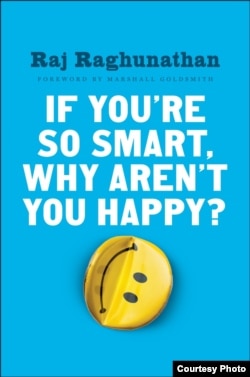Everyone wants to be happy, but true happiness eludes many of us. Raj Raghunathan thinks he knows why.
The marketing professor at the University of Texas in Austin is known as Dr. Happy-smarts. He's been teaching a very popular course on happiness for seven years, attracting thousands of students, both at UT and at the Indian School of Business in Hyderabad, as well as online.
Often, he said, people just wish to be happy but lose sight of happiness as an important part of their goals.
“All of us seem to have three important life goals,” he said. “One is the goal of being good at doing something. I call this goal mastery. Second is having a sense of belonging, deep intimate connection with at least one other person in this world. Third is the sense of autonomy, or control over your own life.”
Caught up in achieving those goals, many people focus on the behaviors they believe will make them happy, rather than on happiness itself. “We don’t behave in a way that prioritizes happiness in our lives," Raghunathan said. "We instead prioritize other things, like value of money, fame, status or beauty, and so on.”
Happiness is a positive emotion. It doesn't only feel good, Raghunathan said, "it’s also very useful to feel happy. You live longer when you’re happy, for example. You’re more productive if you’re happier. You’re more collegial, a better partner, better parent, if you’re happy.”
Happiness mistakes
But things get in the way of being happy, and in his book, "If You’re So Smart, Why Aren’t You Happy?", Raghunathan calls them “happiness sins.” They include chasing superiority, wanting to be the center of attention, the desire to control others and outcomes, and not giving happiness much priority. He says the smarter and more successful you are, the greater the chance that you commit these sins.
Raghunathan also differentiates between two ways of looking at the world, which can affect how happy we are: the scarcity mindset and the abundance mindset.
He defines the abundance mindset as "a feeling that your life is good, that you already have everything you need in order to be happy. You don’t have to go around searching for it outside of you. And the opposite of the abundance mindset is the mindset of scarcity, that I don’t have enough. You become kind of self-centered, be greedy. You want to hoard. You want to hold on things.”
Achieving happiness
To steer our mindset toward the abundance approach and undo all the “happiness sins,” the professor recommends seven exercises:
1. Prioritize happiness. Remind yourself, especially before making important decisions, that happiness is your goal in life.
2. Express gratitude to somebody who has a positive influence in your life.
3. Practice creative altruism, random acts of kindness. We really derive a lot of joy from doing good for other people.
4. Lead a healthy lifestyle. Sleep well, eat well, exercise.
5. Learn to forgive. It turns out that when we hold grudges, it actually hurts us more than it hurts the person against whom we have this grudge.
6. Bring yourself to believe that what’s happening, even if it’s negative, is eventually going to be a good thing for you.
7. Practice mindfulness, just being in the moment.
Practicing those exercises, Raghunathan says, can help you respond to the question posed in the title of his book with the answer, "I'm happier now."

